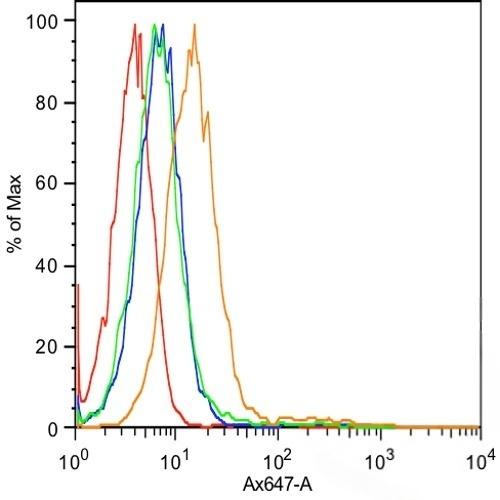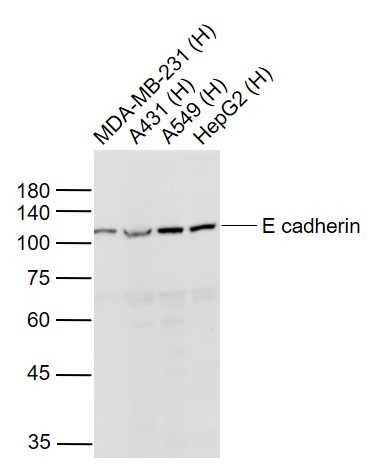Shopping Cart
Remove All Your shopping cart is currently empty
Your shopping cart is currently empty
Anti-E-Cadherin/Cadherin-1 Polyclonal Antibody 3 is a Rabbit antibody targeting E-Cadherin/Cadherin-1. Anti-E-Cadherin/Cadherin-1 Polyclonal Antibody 3 can be used in FCM,WB.
| Pack Size | Price | USA Warehouse | Global Warehouse | Quantity |
|---|---|---|---|---|
| 50 μL | $221 | 7-10 days | 7-10 days | |
| 100 μL | $372 | 7-10 days | 7-10 days | |
| 200 μL | $528 | 7-10 days | 7-10 days |
| Description | Anti-E-Cadherin/Cadherin-1 Polyclonal Antibody 3 is a Rabbit antibody targeting E-Cadherin/Cadherin-1. Anti-E-Cadherin/Cadherin-1 Polyclonal Antibody 3 can be used in FCM,WB. |
| Synonyms | UVO, LCAM, E-Cadherin, E-cad, ECAD, CDHE, CDH1, CD324, cadherin 1, type 1, E-cadherin (epithelial), Arc-1 |
| Ig Type | IgG |
| Reactivity | Human (predicted:Horse,Cow,Pig,Dog,Chicken,Rat,Mouse) |
| Verified Activity | 1. Histogram of MCF7 cells stained with anti-E-cadherin (orange), isotype control antibody (green), secondary antibody only (blue) and unstained (red). 2. Sample: Lane 1: MDA-MB-231 (Human) Cell Lysate at 30 μg Lane 2: A431 (Human) Cell Lysate at 30 μg Lane 3: A549 (Human) Cell Lysate at 30 μg Lane 4: HepG2 (Human) Cell Lysate at 30 μg Primary: Anti-E cadherin (TMAB-00586) at 1/500 dilution Secondary: IRDye800CW Goat Anti-Rabbit IgG at 1/20000 dilution Predicted band size: 125 kDa Observed band size: 120 kDa   |
| Application | |
| Recommended Dose | WB: 1:500-2000; FCM: 1μg/Test |
| Antibody Type | Polyclonal |
| Host Species | Rabbit |
| Subcellular Localization | Cell junction. Cell membrane; Single-pass type I membrane protein. |
| Tissue Specificity | Non-neural epithelial tissues. |
| Construction | Polyclonal Antibody |
| Purification | Protein A purified |
| Appearance | Liquid |
| Formulation | 0.01M TBS (pH7.4) with 1% BSA, 0.02% Proclin300 and 50% Glycerol. |
| Concentration | 1 mg/mL |
| Research Background | This gene encodes a classical cadherin of the cadherin superfamily. Alternative splicing results in multiple transcript variants, at least one of which encodes a preproprotein that is proteolytically processed to generate the mature glycoprotein. This calcium-dependent cell-cell adhesion protein is comprised of five extracellular cadherin repeats, a transmembrane region and a highly conserved cytoplasmic tail. Mutations in this gene are correlated with gastric, breast, colorectal, thyroid and ovarian cancer. Loss of function of this gene is thought to contribute to cancer progression by increasing proliferation, invasion, and/or metastasis. The ectodomain of this protein mediates bacterial adhesion to mammalian cells and the cytoplasmic domain is required for internalization. This gene is present in a gene cluster with other members of the cadherin family on chromosome 16. [provided by RefSeq, Nov 2015] |
| Immunogen | KLH conjugated synthetic peptide: human E-cadherin |
| Antigen Species | Human |
| Gene Name | CDH1 |
| Gene ID | |
| Protein Name | Cadherin-1 |
| Uniprot ID | |
| Biology Area | Cadherins,Kidney development,e cadherin,Cadherins,Calcium Binding Proteins |
| Function | Cadherins are calcium-dependent cell adhesion proteins. They preferentially interact with themselves in a homophilic manner in connecting cells; cadherins may thus contribute to the sorting of heterogeneous cell types. CDH1 is involved in mechanisms regulating cell-cell adhesions, mobility and proliferation of epithelial cells. Has a potent invasive suppressor role. It is a ligand for integrin alpha-E/beta-7. E-Cad/CTF2 promotes non-amyloidogenic degradation of Abeta precursors. Has a strong inhibitory effect on APP C99 and C83 production. |
| Molecular Weight | Theoretical: 90/97 kDa. |
| Stability & Storage | Store at -20°C or -80°C for 12 months. Avoid repeated freeze-thaw cycles. |
| Transport | Shipping with blue ice. |
| Size | Quantity | Unit Price | Amount | Operation |
|---|

Copyright © 2015-2026 TargetMol Chemicals Inc. All Rights Reserved.